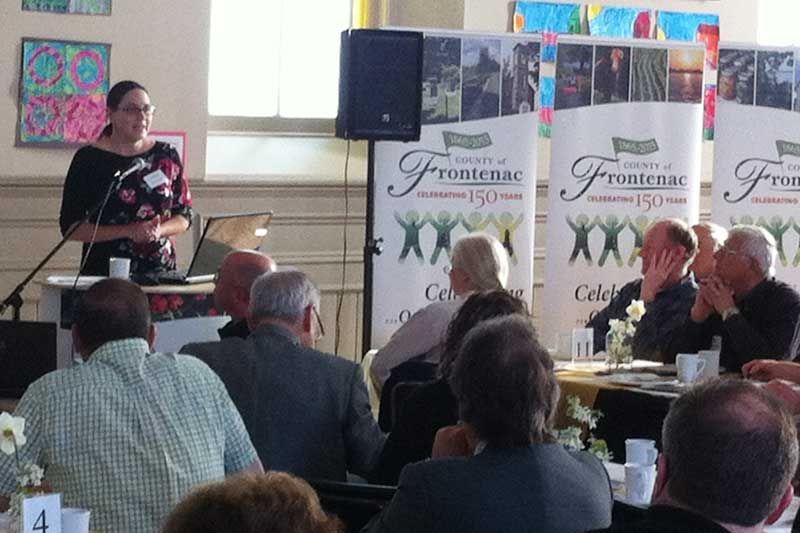May 14, 2015
by Jonathan Davies
It was by all accounts a record turnout at Frontenac County's Sustainability Breakfast on May 8 at the Grace Centre in Sydenham. Interested citizens, representatives from each of the county's municipal councils, as well as people engaged in issues ranging from watershed management, social housing, services for the disabled, and agriculture, to name a few, took the opportunity to learn from presenters and network with potential partner organizations.
The event, hosted annually to celebrate the diverse contributions across Frontenac's communities towards sustainability, is part of the implementation of the county's Sustainability Plan, Directions for Our Future.
Desert Lake Gardens supplied a delicious meal, which included a range of locally-sourced products.
Local food – an issue prioritized in the plan - would be discussed over the course of the morning, along with sustainable agriculture and watershed stewardship, but sustainability, in the context of the plan, goes beyond what usually comes to mind – matters of land, water, and air – and includes social and cultural dimensions.
The priorities identified for 2015, for example, include a focus on low-impact tourism, the restoration of ecologically-minded farming, and supporting lake water quality, but the Official Plan also includes issues such as transportation and access to affordable housing, particularly for seniors.
“Sustainability Plans are often thought of as being about green energy and energy conservation, and the social and cultural pillars can quickly be forgotten,” notes Alison Vandervelde, communications officer with the County and organizer of the breakfast. She also points out that the content discussed over the course of the morning is evidence that the community has taken to this broader view of sustainability, as cultural and environmental issues seemed to receive equal focus.
While the county leads the discussions around Directions for Our Future, the process is not one of top-down directives but of community-coordinated initiatives. As Vandervelde points out, many projects are led by townships, community groups, or a combination of these, along with direction from the county itself. Within the past five years, projects have included a para-medicine pilot project in Marysville; a seniors' housing pilot project, and the subsequent establishment of council's Seniors Housing Task Force; and funding for a variety of “Small-Scale Community Funding Initiatives,” which have focused in part on infrastructure such as trails, bridges and hydrants.
Susan Hall, vice-president and partner at LURA, a collaborative planning consultancy, spoke to the full hall about her experience working with counties and municipalities across Ontario and in other parts of Canada. Her presentation, entitled “Sustainability 2.0,” focused on the need for local governments and their partners in sustainability to step away from “silo-style decision making” and find ways of collaborating effectively. She also stressed the importance of having key people involved in projects who are connected to those with the power to make decisions.
She noted that while shared resources and financial benefits are key to effective collaborations, of equal importance is having opportunities to network with and learn from potential and existing partner organizations and citizens. Furthermore, in order to be effective, those charged with addressing sustainability need not only to identify issues that are most relevant to the community's needs, but also to engage the public with the right message and the right media.
Engagement efforts appear to have been well-received in Frontenac County if attendance at Friday's event are any indication. Two opportunities the county provides for public consultation, beyond the Sustainability Breakfast, are a fall workshop, where the community's input is gathered to help inform the following year's priorities, and monthly Sustainability Advisory Committee meetings, where members of the public may present on issues they would like the committee to consider.
More Stories
- No Winner Yet in Catch The Ace But Fundraising Target Met
- South Frontenac Food Bank Opens Second Location in Battersea
- Sharbot Lake Pentecostal Church Anniversary - 1925-2025
- Frontenac Holistic Health Fair - September 20 At Storrington Centre
- Odd Year For Real Estate - But Sales Are Steady Year Over Year
- 193rd Kingston Fall Fair
- Kim Phuc - the Napalm Girl - To Visit Flinton In November
- South Frontenac Council - September 2
- Sticker Shock - EV Charging Station To Cost North Frontenac Township
- 30th Anniversary Verona Car Show

